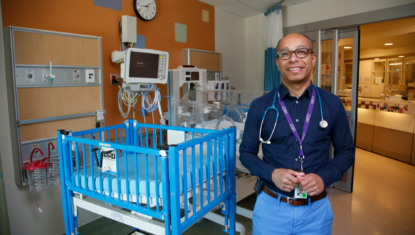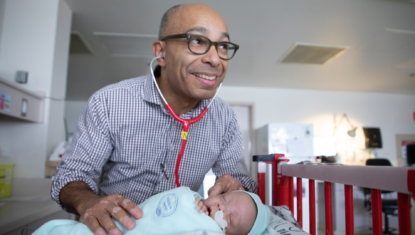Dr. Bernard Thébaud is a clinician-scientist recruited to Ottawa from Edmonton in 2012 to accelerate the translation of stem cell-based therapies for lung diseases.His lab studies the mechanisms of lung development, injury and repair in order to design new treatments for incurable lung diseases. The current focus is on stem cell-based and gene therapies. He has set out an ambitious research program in order to study clinically relevant questions for translation into real-life applications. His unique multi-disciplinary program offers the full scope of translational research from (i) discovery research in the petri dish to (ii) manufacturing and preclinical in vitro and in vivo testing of novel cell/gene therapies to (iii) preparing and conducting clinical trials. Over the next five years, his goal is to bring safe and effective cell-based therapies for lung diseases into the clinic, and thereby create vast improvements in patient outcomes. A phase I Trial (HULC-I: Helping Under-developed Lungs with Cells) will be underway in 2020. Dr. Thébaud holds the University of Ottawa Partnership Research Chair in Regenerative Medicine. His research is funded by a CIHR Foundation Scheme grant, the Heart and Stroke Foundation of Canada, theStem Cell Network and the Ontario Institute of Regenerative Medicine.
Related News
-

14/11/2024
Dr. Bernard Thébaud Appointed Tier 1 Canada Research Chair in Lung Stem Cell Biology and Regeneration
-

16/09/2024
CIHR funds Phase 2 of world-first cell therapy trial to heal the lungs of preterm babies
-

24/01/2024
Tiny trailblazer: First baby treated in world-first trial for chronic lung disease
Research Projects
-
Efficacy of mesenchymal stromal cells in preclinical models of necrotizing enterocolitis: a systematic review protocol
05/10/2021
This systematic review aims to examine the efficacy of mesenchymal stromal cells in preclinical models of necrotizing enterocolitis and whether there is sufficient evidence to support a clinical trial of efficacy and safety of the treatment with mesenchymal stromal cells in infants with necrotizing enterocolitis.
-
A lung tropic AAV vector improves survival in a mouse model of surfactant B deficiency
06/08/2020
This vector also transduces human lung tissue, demonstrating its potential for clinical translation against this lethal disease.
-
Characterization of the innate immune response in a novel murine model mimicking bronchopulmonary dysplasia
01/05/2020
This is the first report of in-depth characterization of the lung injury and recovery describing the evolution of the innate immune response in a standardized mouse model for experimental BPD with postnatal LPS and hyperoxia exposure.
-
Are all stem cells equal? Systematic review, evidence map, and meta‐analyses of preclinical stem cell‐based therapies for bronchopulmonary dysplasia
01/11/2019
We performed a systematic review and network meta‐analysis (NMA) of preclinical studies testing cell‐based therapies in experimental neonatal lung injury.
-
Target oxygen saturation and development of pulmonary hypertension and increased pulmonary vascular resistance in preterm infants
01/01/2019
Higher targeted oxygen saturation was associated with reduced risk of PH or elevated PVR in extremely preterm infants compared to lower oxygen saturation target.

